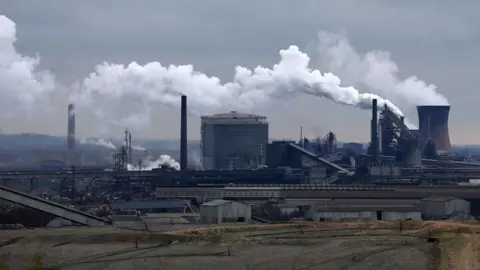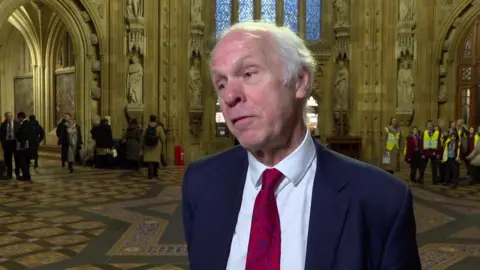Steelworks 'need to be part of town's future' - MP
 Lindsey Parnaby / Contributor (via Getty)
Lindsey Parnaby / Contributor (via Getty)Talks to secure a deal on the future of British Steel in Scunthorpe are set to continue in the new year, officials said.
It comes after it was previously reported the blast furnaces at the site could shut before Christmas, with workers quitting amid uncertainty.
British Steel confirmed in November that its blast furnaces would continue to operate beyond 2024.
Scunthorpe MP Sir Nic Dakin said both British Steel owner Jingye and the government were keen to reach an agreement.

The blast furnaces have been earmarked for closure since 2023, amid a planned switch to more energy efficient electric arc furnaces.
Sir Nic said: "This is not a new story, but it's a new opportunity. If we look at the steel industry, the last time it had really major investment was probably in the 1970s, 1980s.
"I do very much hope that the investment needed in Scunthorpe comes from a partnership deal between Jingye and the government.
"It [the steelworks] is a very important part of our past, part of our present, [and] we need it to be part of our future."
Martin Foster, from the Unite union, said its members accepted steel needed to be produced "in a greener way".
"The concern is how you transition to that greener way of doing it - that's where the argument and the debate is," he added.
Ian Linklater, from the Community Union, said: "The best deal for us would be the continuation of the traditional steel-making methods, along with electric and diversification.
"It should be [about] decarbonisation not deindustrialisation."
'Ongoing discussions'
A British Steel spokesperson said: "We are in ongoing discussions with the government about our decarbonisation plans and the future operations of our UK business. While progress continues, no final decisions have been made."
A spokesperson for the Department for Business and Trade said the government would not allow "the end of steel-making in the UK", adding that the government had committed up to £2.5bn of investment to rebuild the UK steel industry and support communities.
"We're working across government in partnership with trade unions and businesses, including British Steel, to secure a green steel transition that's right for the workforce, represents a good investment for taxpayers and safeguards the future of the steel industry in Britain."
Electric arc furnaces work by funnelling a current through electrodes into the furnace, a process which is less energy-intensive than blast furnace production, and takes out the need for high carbon-emitting coke to be used in the process.
The previous government said replacing blast furnaces with electric arc furnaces could "reduce UK’s entire carbon emissions by around 1.5%".
Listen to highlights from Lincolnshire on BBC Sounds, watch the latest episode of Look North or tell us about a story you think we should be covering here.
